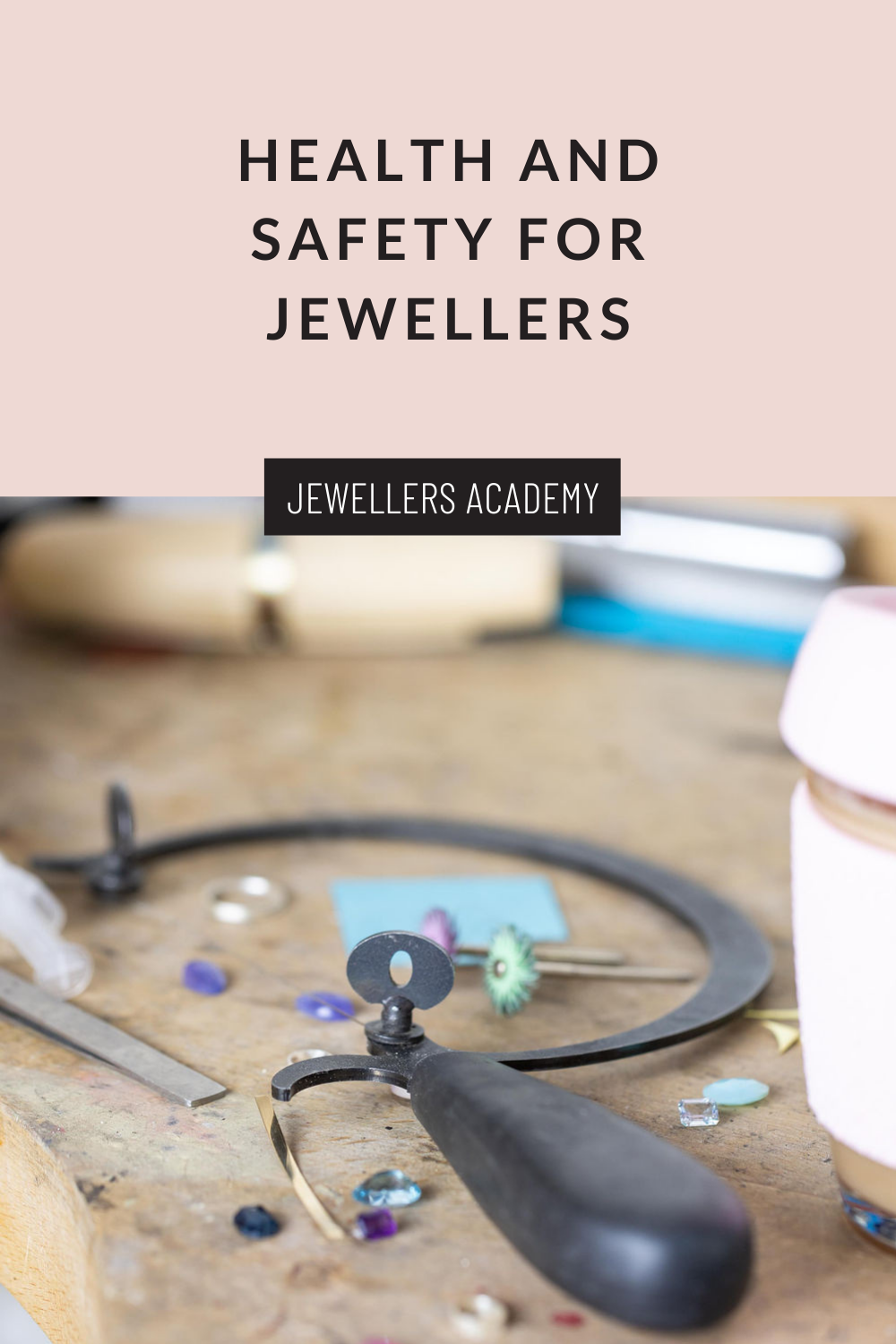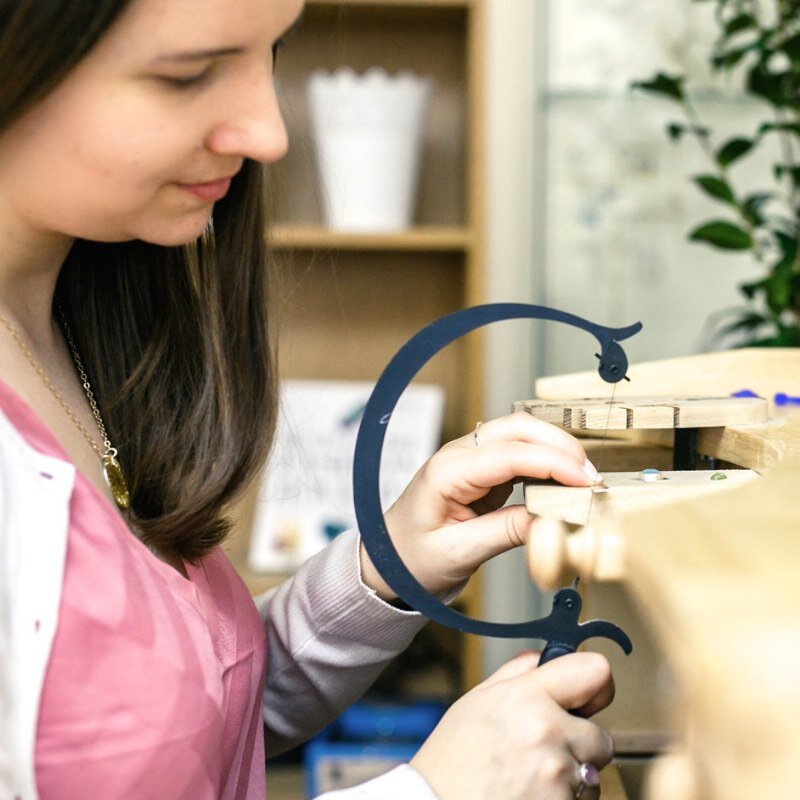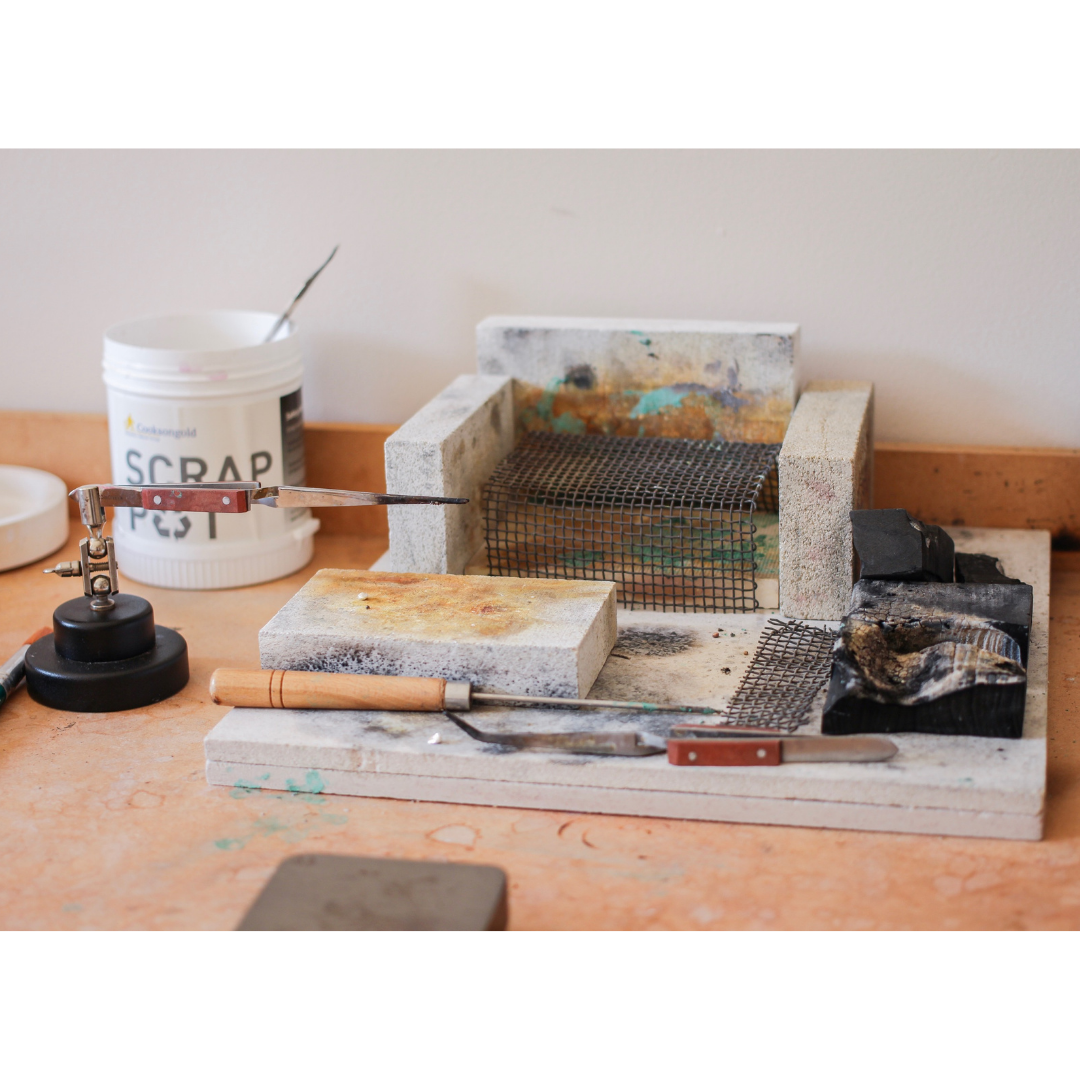Health and safety for jewellers
Blog
As jewellers we work with tools, heat and chemicals. So how do we ensure we do so safely? Take a look at our comprehensive health and safety for jewellers guide
don’t panic!
First of all, don't panic! If you are new to jewellery making this can all seem quite overwhelming to start with. The key is to familiarise yourself with how to safely use the equipment, concentrate on what you are doing and be prepared.
Whenever someone has an accident they often say 'that was stupid' - they know that it was a silly mistake. By being mindful of what you are doing you will make lovely jewellery without any incidents!
safety at the bench
Although you will probably be working from home, you still need to get ready to start your jewellery making as you would if you were working in a professional jewellers studio (who knows, you may be one day!)
Always wear closed-toed shoes
Please be sure to wear closed-toed shoes when making jewellery as we work around chemicals, heat and tools (no slippers, sandals or flip flops)
Safety glasses
Wear safety glasses when using your torch, dremel or when filing
Mask
Generally, for the making you will do on our courses you will not need a dust mask. However, if you do have repiratory problems, asthma or are jewellery making full time you may choose to wear a dust mask when sanding, filing, soldering or polishing. We would suggest a good quality filtered mask for example the 3M mask respirator or similar.
Apron
This is optional but you may choose to wear an apron when you are working to protect your clothing
Hair and jewellery
If you have long hair you must tie it back before you do any type of jewellery making. Remove all long jewellery, scarves etc that could get in the way of your work
Hand washing
It is important to wash your hands before you start work and after you have finished.
If you suffer from dermatitis or eczema and you do find you have a flair up when making jewellery you could try Gloves in a Bottle. It is a hand cream that helps protect your hands
Your workspace
You may be lucky enough to be able to set up a workspace. Others may not have the space and will have to pack up their equipment each time. When considering where to work ensure that you have good ventilation - a window that can open is important. For the type of jewellery making we do on this Diploma course dilution ventilation is sufficient. This is where you open a window next to you and another one elsewhere in the flat/house so that air passes past you on its way out.
You also want to ensure you have good lighting. Consider whether you might need to get a lamp if the space is not well-lit or you will be working in the evenings.
Regular cleaning of your work area is essential - wet wipe all surfaces to remove dust traces rather than brush/hoover.
Children and animals
If you have children and/or animals do think carefully about how you set up your space. Don't leave sharp tools lying around, lock away your torch, lighter gas or any other piece of equipment a curious child might want to look at
back health and posture
It is important to consider your posture and your back when you are a jeweller. Here are some ways to do this:
ensure your chair helps you keep your back straight with your feet placed on the floor
minimise the amount of hunching or stretching you will need to do by adjusting your chair and/or the height of your work surface. For comfort, your benchpeg should be a chest height. Jewellers benches are higher than normal tables so you may need to have either an adjustable chair that you can adjust lower than normal or build up your table to be a bit higher if needed
try to keep the tools you regularly need close by
Take regular breaks
It is easy to get into the zone and forget about your physical health. Taking regular breaks or varying your activity can help with this
Stretch
Take the time to get up and stretch regularly
Jewellers Retreat yoga session
As part of the Jewellers Retreat we were joined by yoga instructor Susie Vandie who created a free yoga workout
designed especially for jewellers
You can watch the replay and follow the exercises she recommends
safety equipment
It's important to be prepared with the equipment you need:
Fire blanket
We recommend you purchase a fire blanket for your workspace
First aid kit
It is a sensible precaution to ensure you have a basic first aid kit in your workspace. This should include plasters, bandages, sterile gauze, antiseptic cream and burn cream.
Safety glasses
We recommend you wear safety glasses when using your dremel, torch or filing metal or wax.
You must wear safety glasses when you are polishing and when using any type of powered tool e.g. the dremel
Mask
Generally, for the making you will do on our courses you will not need a dust mask. However, if you do have repiratory problems, asthma or are jewellery making full time you may choose to wear a dust mask when filing, soldering or polishing. We would suggest a good quality filtered mask for example the 3M mask respirator or similar.
Protecting your hands and fingers
Some people like to wear alligator tape or similar when polishing or doing repetitive actions like filing or sanding
Apron
You may choose to wear an apron to protect your clothing
Pickle pot - safety timer switch
Your jewellers pickle needs to be switched off when not in use. If you worry that you may not be able to remember to do this you could buy a timer switch plug to ensure it turns off automatically
Dust pan and brush
After you have finished working, do sweep up any metal, broken saw blades etc that may have fallen on the floor. It is great to stay tidy but also important that you don't step on anything sharp.
safety when soldering
Soldering is the process of joining two metals together using heat. To do this you will be using a jewellers torch and the metal you are soldering will get very hot (at least 700 degrees Centigrade) so it is important that you are set up correctly and concentrate on what you are doing.
Setting up
Ensure you have your heatproof soldering mat underneath your firing block. You also have additional firing blocks that you can use. Watch the course video carefully all the way through before setting up your bench/workspace and starting to solder
Heatproof/pyrex water bowl - Fill this up with water before you start. This is used for quenching the metal (putting hot metal in to cool it down quickly)
Optional but recommended: have a fire blanket nearby
Ensure there is nothing flammable around on your bench
While soldering
Wear safety glasses
Ensure your hair is tied back, remove long jewellery and scarves and any loose clothing
Solder in short bursts. We wouldn't recommend trying to do soldering work for more than 20 minutes because you need to keep your concentration
Place any hot items e.g. your torch away from you on your work surface after using them. This will help ensure you don't brush past them or touch them accidentally
Remember that the metal you are soldering, any tweezers that are touching the metal, the tip of the torch etc will get very hot so ensure they cool down before touching them
Storage for your universal gas butane lighter
Store your universal gas can well away from your torches, preferably in a separate room in a cool, dry cupboard
safety when polishing
When you are polishing, particularly with a motorised polisher e.g. a dremel, you need to concentrate and be aware of what you are doing.
Ensure your hair is tied back
Don't wear anything that could drop forward into the dremel e.g. a scarf, long jewellery etc
Optional - wear an apron to cover and protect your clothing
Wear safety goggles
Wear a dust mask if you have respiratory issues or will be doing a lot of polishing
Ensure your workspace is well ventilated
Take regular breaks to ensure you keep your concentration
You can use alligator tape on your fingers and thumb when you are holding a piece of jewellery you are polishing to protect them
When you're polishing, the piece can get hot because of the friction. If it does, stop to allow the piece to cool before continuing. Placing it on a steel block will help to cool it down quickly
working with pickle
Pickle is an acid solution that is heated. It is used to remove firescale from heated metals.
To make your own simple solution using safety pick granules, follow these instructions…
You will need:
A designated slow cooker pot
Safety pickle granules
Hot but not boiling water (so probably a kettle)
Plastic or brass tweezers
Directions:
Follow the directions on the pickle solution you have. Here is what you will do for guidance:
Add a small spoonful of safety pickle granules into your clean slow cooker. Use either a wooden or plastic spoon (not a metal one – steel reacts with the acid in the pickle)
Add a small amount of cold water followed by boiling water so that overall you have hot but not boiling water in your slow cooker
Mix the solution with your plastic spoon or tweezers until it has dissolved
You can now pickle your piece.
The pickle solution will work for as long as it stays hot so when you've finished using it make sure you turn the slow cooker off.
Safety timer switch
Your jewellers pickle needs to be switched off when not in use. If you worry that you may not be able to remember to do this you could buy a timer switch plug to ensure it turns off automatically
Ideally you don’t want to get the pickle on your hands and clothes but don’t be afraid of it, it is a mild acid solution, just be sure to wash your hands or any area of your skin if you do get it on you at all.
Avoid contact with eyes.
Remember, if you do have any medical concerns please do contact your doctor to discuss any issues that relate to you and your health status.
Do ensure you carefully read any safety guidance you are provided with any of our courses and with any equipment you buy. By making sure you know what you are doing and keeping your concentration you’ll be making gorgeous jewellery without incident!
Did you know that you can purchase individual online jewellery making courses from us that you can watch whenever you want? We have beginners to advanced level courses in silver, stone setting, wax carving, metal clay, beading and wire.
Take a look!







